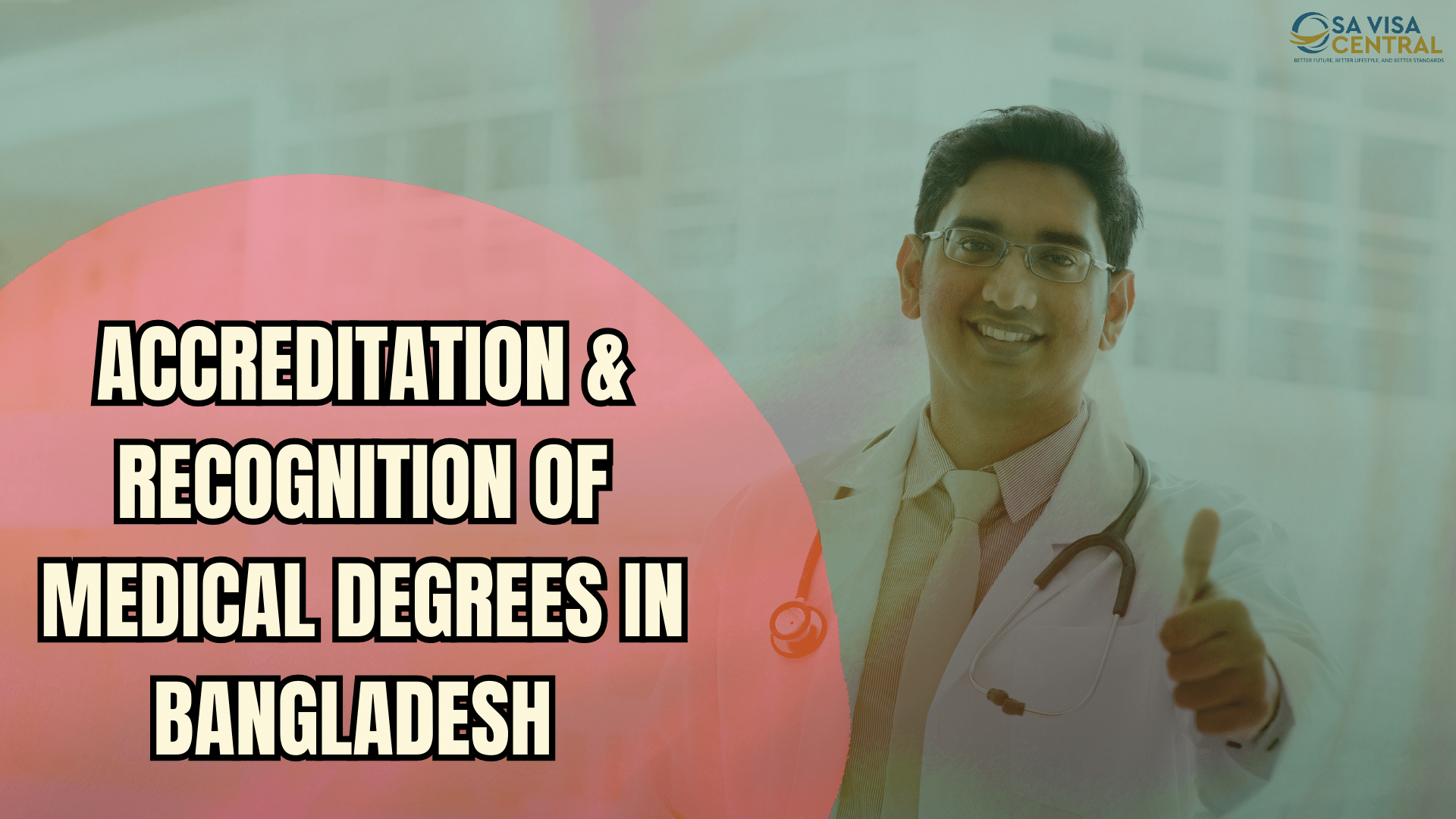Understanding the Accreditation and Recognition of Medical Degrees in Bangladesh is essential for aspiring medical professionals and those seeking medical education in the country. Accreditation and recognition play a crucial role in ensuring the quality and standardization of medical degrees. In Bangladesh, the accreditation and recognition process is overseen by several key bodies. The Bangladesh Medical and Dental Council (BMDC) and the University Grants Commission (UGC) are two prominent organizations involved in this process. Accreditation involves assessing whether medical degree programs meet specific standards and requirements, while recognition signifies that a medical degree is accepted and valued by regulatory authorities and other institutions. The accreditation process involves evaluating the curriculum, faculty qualifications, facilities, and other factors, while recognition is based on criteria and guidelines set by the authorities. Understanding the importance of accreditation and recognition in medical degrees is crucial for making informed educational choices and ensuring career prospects in the medical field in Bangladesh. https://www.youtube.com/embed/GB0h0-KP6mY
Table of Contents
What is Accreditation and Recognition?
Curious about the world of medical degrees in Bangladesh? Let’s dive into the realm of accreditation and recognition. This section aims to unravel the mysteries behind these important terms and shed light on their significance. We’ll explore the ins and outs of understanding the accreditation of medical degrees, as well as gain insights into the complex world of recognizing medical degrees. Get ready to uncover the essential knowledge that lies within this section!
Understanding Accreditation of Medical Degrees
Accreditation of medical degrees is crucial for understanding the quality and standard of medical education in Bangladesh. It is the process by which a medical educational institution is evaluated and recognized by a recognized authority or council. This evaluation assesses various aspects of the institution, including faculty qualifications, curriculum, infrastructure, and educational resources.
The accreditation process is conducted by bodies such as the Bangladesh Medical and Dental Council and the University Grants Commission. These bodies establish criteria and guidelines for accreditation and conduct comprehensive evaluations of medical institutions to assess their compliance with these standards.
Obtaining accreditation is essential for medical institutions as it signifies their adherence to the highest standards of education. It ensures that graduates from accredited programs have received the necessary training and education to practice medicine effectively. Accreditation also increases the trust and confidence of stakeholders, including students, parents, and the public, in the quality of education provided by the institution.
Understanding the accreditation of medical degrees benefits aspiring medical students, helping them make informed decisions about their choice of educational institutions. By considering the accreditation status of a medical school, students can ensure they will receive a high-quality education that meets accrediting body standards.
Understanding Recognition of Medical Degrees
Understanding recognition of medical degrees is crucial for students pursuing medical education in Bangladesh. Recognition validates and accepts a medical degree, allowing graduates to practice medicine.
In Bangladesh, the Bangladesh Medical and Dental Council (BMDC) grants recognition after evaluating curriculum, infrastructure, faculty, and overall quality. The process involves thorough evaluation, documentation, and assessment to meet BMDC criteria.
Recognition is important as it enables further studies and international practice. It ensures a quality education meeting standards set by organizations like WHO and WFME. To understand recognition, students should gather information on BMDC criteria and the evaluation process.
This understanding helps students make informed decisions about their medical education, choosing institutions with recognized degrees.
Accreditation and Recognition Bodies in Bangladesh
When it comes to the accreditation and recognition of medical degrees in Bangladesh, understanding the key governing bodies is essential. In this section, we’ll take a closer look at two vital organizations: the Bangladesh Medical and Dental Council and the University Grants Commission. Discover the role these bodies play in ensuring the quality standards and credibility of medical education in Bangladesh, paving the way for promising healthcare professionals. So, let’s dive into the heart of the accreditation and recognition landscape in this fascinating country.
The Bangladesh Medical and Dental Council
The Bangladesh Medical and Dental Council oversees medical and dental education in Bangladesh. It maintains the standards and quality of medical education in the country.
The council ensures that medical educational institutions adhere to their guidelines and requirements. They assess the curriculum, faculty qualifications, infrastructure, and clinical facilities to ensure necessary standards are met.
In addition to accreditation, the Bangladesh Medical and Dental Council grants recognition to medical degrees. This recognition is important for international students wishing to pursue medical education in Bangladesh. It ensures that their degree is accepted globally.
The council’s recognition allows graduates to practice medicine in Bangladesh and abroad. It also enables them to appear for international licensure exams conducted by other countries’ medical councils.
The Bangladesh Medical and Dental Council plays a vital role in assessing the quality of medical education, essential for producing competent healthcare professionals. Their processes contribute to the improvement of the healthcare sector in Bangladesh.
The University Grants Commission
The University Grants Commission (UGC) in Bangladesh is responsible for accrediting and recognizing medical degrees.
It sets criteria and guidelines for accreditation and recognition, collaborating with accreditation bodies like the Bangladesh Medical and Dental Council (BMDC).
Accreditation ensures that educational institutions meet standards in faculty, infrastructure, curriculum, and more.
Recognition by the UGC is important for international students studying medicine in Bangladesh, as it ensures that their degrees are recognized by regulatory bodies in other countries.
This is crucial for practicing medicine abroad or pursuing further studies in the medical field.
To enhance education quality, the UGC regularly assesses and evaluates undergraduate medical education, identifying areas for improvement and encouraging high standards.
Higher education in Bangladesh may not have the best reputation, but when it comes to medical degrees, they’re taking their shot at redemption.
Accreditation Process for Medical Degrees in Bangladesh
Delving into the accreditation process for medical degrees in Bangladesh, we uncover the essential requirements, evaluation methods, and decisions that shape this crucial aspect. From the steps involved in accreditation to the duration of its validity, we will navigate the intricate process that determines the recognition and validity of medical degrees. So, let’s explore the journey of accreditation in Bangladesh’s medical education landscape and understand the essential elements that play a significant role in shaping the quality and standards of medical training.
Requirements for Accreditation
- In order to meet the requirements for accreditation, the medical educational institution must have proper infrastructure and facilities for a conducive learning environment.
- To meet the requirements for accreditation, the faculty members must have adequate qualifications and experience in their respective fields.
- In order to fulfill the requirements for accreditation, the curriculum must be comprehensive, covering all essential subjects and providing practical training opportunities.
- To meet the requirements for accreditation, there should be a sufficient number of clinical departments and hospitals for students to gain hands-on experience.
- The institution must have a good passing rate in the medical council examinations to meet the requirements for accreditation.
- To maintain the quality of education and meet the requirements for accreditation, regular assessments and evaluations must be conducted.
Pro-tip: When researching medical degrees in Bangladesh, pay close attention to the accreditation requirements to ensure that the institution meets the necessary standards for a quality education in medicine.
Accreditation Evaluation and Site Visits
Accreditation Evaluation and Site Visits play a crucial role in ensuring the quality of medical degrees in Bangladesh. The Accreditation Council diligently examines various aspects of medical institutions during the evaluation process to determine their compliance with set standards. Qualified professionals and experts conduct on-site visits to physically inspect the infrastructure, facilities, and resources available at these institutions.
The purpose behind Accreditation Evaluation and Site Visits is to verify that institutions meet the requirements set by the relevant accreditation bodies. This rigorous process helps maintain the high standards of medical education and ensures that these institutions can produce highly competent healthcare professionals.
Thorough evaluations and meticulous site visits enable the Accreditation Council to identify areas that need improvement in these institutions, thereby enhancing the overall quality of medical education in Bangladesh.
It is vital for international students and other stakeholders to understand the significance of Accreditation Evaluation and Site Visits. These processes provide assurance regarding the quality and standard of education offered by medical institutions. By selecting accredited institutions, students can have confidence in receiving a quality education that meets international standards.
Accreditation Decision and Period: Where medical degrees in Bangladesh undergo evaluation and site visits, so you can trust that your future doctor knows their stuff – at least according to these accreditation bodies.
Accreditation Decision and Period
The accreditation decision for medical degrees in Bangladesh is based on evaluating various factors.
The accreditation council determines if a medical educational institution meets the required standards.
If the institution meets the criteria, it receives accreditation for a specified period.
The accreditation period varies depending on the institution’s performance.
A detailed assessment and site visits are conducted to make the accreditation decision.
The decision is based on education quality, facilities, faculty qualifications, passing rates, and other relevant factors.
The accreditation period can range from a few years to a longer duration.
During the accreditation period, the institution must maintain the set standards.
Regular evaluations may be conducted to ensure continued compliance.
If an institution fails to meet standards during the accreditation period, it may have its accreditation suspended or revoked.
Recognition Process for Medical Degrees in Bangladesh
In the realm of medical education, the recognition process for medical degrees in Bangladesh takes center stage. Unraveling the intricacies of this process, we’ll explore the criteria and guidelines that shape the recognition, the evaluation and documentation involved, and ultimately, the pivotal decisions that determine the validity of these degrees. Buckle up as we navigate through the journey of accrediting and recognizing medical degrees in Bangladesh, shedding light on the crucial steps that shape the medical landscape of the country.
Recognition Criteria and Guidelines
Recognition criteria and guidelines play a crucial role in maintaining the quality and standard of medical degrees in Bangladesh. The evaluation process takes into account various factors such as institution information, student passing rate, education quality, and adherence to the guidelines. These guidelines provide a comprehensive framework encompassing essential aspects such as infrastructure, faculty qualifications, curriculum, and facilities that are essential for effective medical education.
For universities and colleges seeking recognition, a thorough evaluation is carried out. This evaluation includes a review of documentation, assessment of infrastructure, faculty qualifications, and the teaching-learning process. Esteemed bodies like the Bangladesh Medical and Dental Council, in collaboration with the University Grants Commission, are responsible for conducting this evaluation.
The decisions regarding recognition are solely based on the institution’s compliance with the established criteria and guidelines. It is important to note that the recognition is valid for a specific period, during which the institution must consistently maintain the required standards of education.
It is worth mentioning that renowned organizations such as the World Health Organization and the World Federation for Medical Education highly encourage countries to establish robust accreditation and recognition processes in order to enhance medical education and foster growth in the healthcare sector.
Documenting the evaluation process is crucial for the recognition of medical degrees in Bangladesh.
Recognition Evaluation and Documentation
Recognition, evaluation, and documentation are integral components in the process of accrediting medical degrees in Bangladesh. These three elements collectively contribute to determining if medical educational institutions meet the necessary criteria and guidelines for recognition. Experienced experts meticulously review the provided documentation to ensure it aligns with the established guidelines.
Documentation serves as concrete evidence that verifies the quality of education imparted by medical educational institutions. It serves as a testament to their compliance with the required standards for recognition. This comprehensive documentation encompasses details about various aspects such as teaching methods, faculty qualifications, assessment techniques, student performance, and infrastructure.
The evaluation of this documentation is of utmost importance as it plays a crucial role in assessing the legitimacy of medical degrees offered by these institutions. Through this evaluation process, it is ensured that the degrees not only meet the necessary standards but also uphold a high level of quality. For international students, this evaluation offers them the assurance that their degrees will be acknowledged in their home countries.
Making the cut or being left in the dust, understanding the recognition decision and validity of medical degrees in Bangladesh.
Recognition Decision and Validity
The recognition decision and validity of medical degrees in Bangladesh play a crucial role in upholding the quality and standards of education provided by medical institutions. The evaluation and assessment of these degrees are carried out by the Bangladesh Medical and Dental Council, in collaboration with the University Grants Commission. They follow specific criteria and guidelines to determine the recognition status.
Once a medical degree is recognized, it remains valid for a specific period of time. The validity of this recognition ensures that the degree holds value and is accepted both nationally and internationally within the healthcare sector. It allows graduates to practice medicine and also opens doors for further education and specialization.
The recognition decision is especially significant for international students who are pursuing medical education in Bangladesh. It provides them with the assurance that their degree will be acknowledged in their home countries, allowing them to practice medicine abroad if they choose to.
It is always advisable to conduct thorough research and gather information about the recognition status and validity of a medical degree in Bangladesh before making a decision. This will guarantee a high-quality education and the certainty that your degree will be valued in the medical field.
Conclusion
The importance of accreditation and recognition in medical degrees cannot be overstated. Accreditation ensures that the medical program meets quality and educational standards. It validates the qualification obtained by the student and allows them to practice medicine in their respective fields.
Accreditation and recognition provide assurance that healthcare professionals have undergone rigorous training and met necessary standards to provide quality care. It maintains the trust and confidence of the medical fraternity.
Without proper accreditation and recognition, medical degrees may not be recognized by professional bodies and governing authorities. This could hinder graduates’ employment opportunities and further specialization. It could also compromise patient safety and the effectiveness of healthcare systems.
In the late 19th century, medical education was unregulated and varied in quality. This raised concerns about the competence and proficiency of medical practitioners and patient safety. To address these concerns, accreditation and recognition systems were developed to standardize medical education worldwide. These systems have since evolved and become crucial for the integrity and credibility of medical education.
FAQs
Ques 1. What is the accreditation system for medical degrees in Bangladesh?
Ans 1. The accreditation system for medical degrees in Bangladesh is overseen by the Bangladesh Accreditation Council, which is responsible for recognizing medical educational institutions in the country. This accreditation is necessary for individuals who wish to study or provide medical treatment abroad.
Ques 2. What are the benefits of studying MBBS in Bangladesh for international students?
Ans 2. Studying MBBS in Bangladesh offers several benefits for international students. The country has high-quality education and infrastructure at an affordable cost compared to other countries. The degrees from Bangladeshi medical universities are recognized by various organizations and allow graduates to practice medicine worldwide. Students are provided with excellent accommodation facilities.
Ques 3. How is the MBBS course structured in Bangladesh?
Ans 3. The MBBS course in Bangladesh follows a semester system and is divided into three phases: Pre-Clinical, Para-Clinical, and Clinical Phase. The medium of instruction is English, and the course duration is five years, followed by a one-year rotatory internship. The study pattern is similar to the guidelines set by the Medical Council of India (MCI).
Ques 4. What is the role of the Bangladesh Medical & Dental Council?
Ans 4. The Bangladesh Medical & Dental Council (BM&DC) is a statutory body that ensures high standards of medical education and recognizes medical qualifications in Bangladesh. It is responsible for registering doctors, maintaining standards, promoting public health and safety, and collaborating with other medical organizations. The council also has a disciplinary committee to investigate complaints against doctors.







